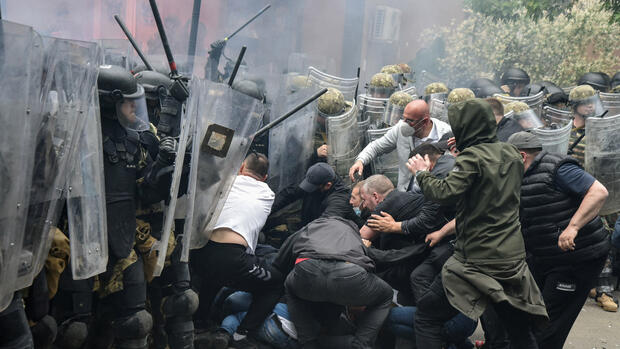Members of the Serb minority in Kosovo engage in street battles with KFOR soldiers.
(Photo: Reuters)
Ankara Broken bones, burns, many injured: That is the outcome of the street battles between NATO forces and militant Serbs in northern Kosovo that began on Monday afternoon. 19 Hungarians and 11 Italians belonging to the international Kosovo Protection Force KFOR were injured in “unprovoked attacks by a violent and dangerous crowd,” the force said in a statement on Tuesday.
According to the hospital in the nearby town of Mitrovica, 53 Serbs were also injured in the clashes. The government in Belgrade has already put its armed forces on high combat readiness and could plunge the young neighboring country in the Balkans into a political crisis.
The protests by the Serb minority in three communities in Kosovo continued on Tuesday – but initially peacefully, as local media reported. The background to the unrest was the local elections about a month ago. Most of the ethnic Serb population in northern Kosovo boycotted the elections.
As a result, ethnic Kosovar Albanians could also be elected mayors with few votes because of the low turnout. When the mayors wanted to take office under the protection of the Kosovar special police, the riots broke out.
The Foreign Office in Berlin condemned the attacks “in the strongest possible terms” and called for “the immediate cessation of all violence and all actions that lead to further tensions”. According to a ministry spokesman, a de-escalation of the situation is “now urgently needed”. Representatives of Kosovo and Serbs must start talks immediately “and continue to work on the implementation of the normalization agreement reached in February and March”.
Serbia’s President pours fuel on the fire
The French Foreign Ministry also called on both sides to act responsibly. EU foreign policy chief Josep Borrell also condemned the clashes. “The EU calls on the authorities of Kosovo and the protesters to immediately and unconditionally de-escalate the situation,” Borrell wrote on Twitter.
It is uncertain whether the de-escalation desired by the West will come about. The Kosovo government blamed Serbian President Aleksandar Vucic for the development. Kosovo’s Prime Minister Albin Kurti wrote on Twitter on Monday evening: “In a democracy there is no room for fascist violence.”
Everything is organized by Albin Kurti and it is his wish that there will be a major conflict between the Serbs and NATO. Serbian President Aleksandar Vucic
Vucic, on the other hand, blamed Kosovo, claiming that police there fired on members of the Serb ethnic minority before the protests escalated. Vucic claimed Kurti would want to start a bloodbath. “In the last three days, even a blind person could see and a politically illiterate could understand what was being prepared here,” explained Vucic. “Everything is organized by Albin Kurti and it is his wish that there will be a major conflict between the Serbs and NATO.”
Kosovo, which is now almost exclusively inhabited by Albanians, declared its independence in 2008. In addition to the approximately 1.8 million inhabitants of Kosovo, over 400,000 Kosovars live abroad, mainly in Germany and the United States. 115 countries recognize the independence of Kosovo. Serbia is not, however, the government in Belgrade is demanding the return of their former province.
Riots in Kosovo: NATO peacekeepers injured
After an armed uprising by the Kosovar Albanians and a NATO intervention against Serbia in 1999, the UN administration Unmik managed the country. KFOR was commissioned by the UN in 1999 to ensure security in Kosovo. It still has about 3,800 soldiers stationed there today, including almost 70 Germans.
Russia and China do not recognize Kosovo either. The government in Moscow is accused of removing the western Balkan states from the sphere of influence of the EU and NATO. Serbia itself has been a candidate for EU membership since 2012, but has not implemented the sanctions against Moscow.
The government in Beijing also commented on the recent violence in Kosovo and expressed understanding for Serbia. China seeks influence in all areas that lie on the trade routes between the country and Central Europe. NATO is called upon to respect the sovereignty and territorial integrity of the countries concerned and to work for peace in the region, said Foreign Ministry spokeswoman Mao Ning in Beijing.
More: Serbia – an ambivalent partner of the EU

